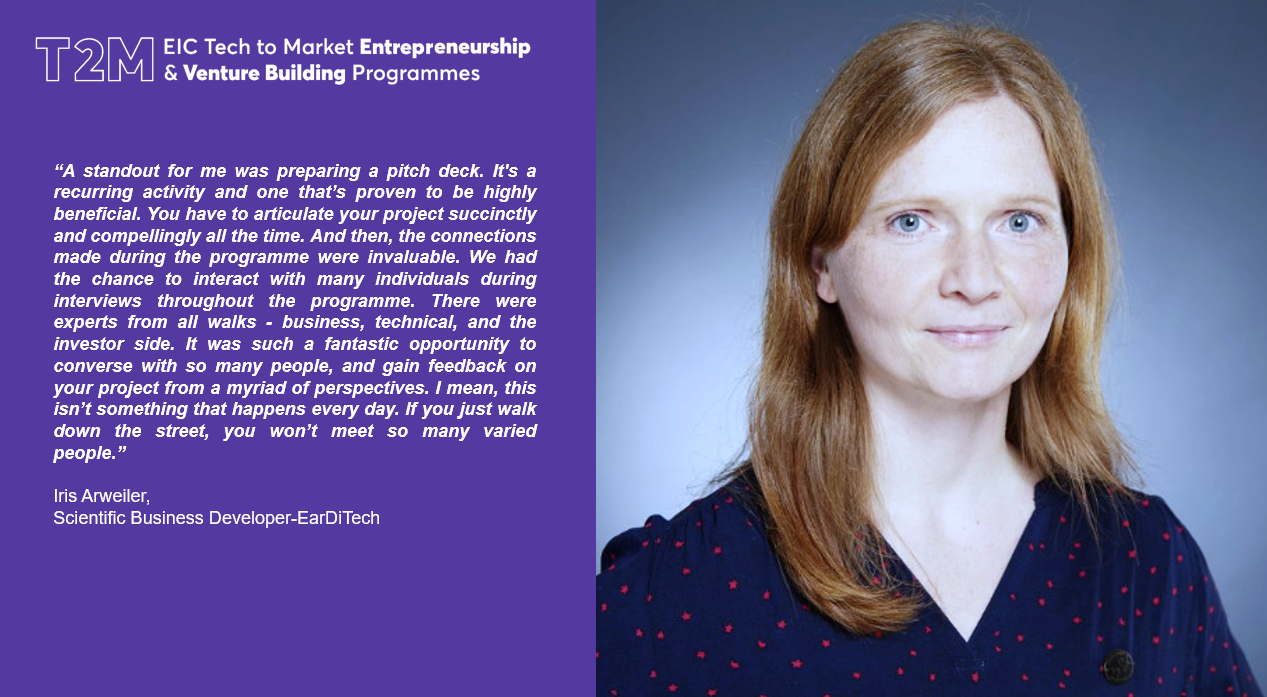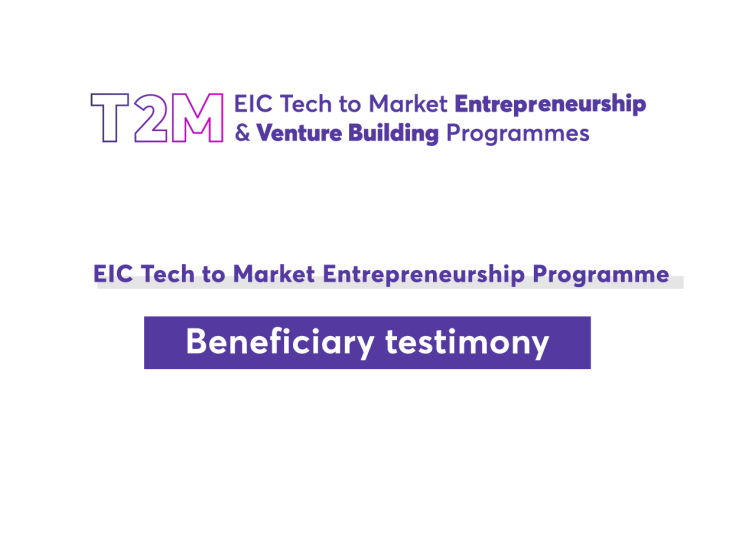The EIC Tech to Market (T2M) Entrepreneurship Programme aims to help deep tech researchers from EIC Pathfinder and EIC Transition projects with entrepreneurial aspiration to acquire the critical knowledge for developing deep-tech based innovations, accelerate the science-startup project and get support for building a strong Value Proposition and a viable Business Model.
The EIC T2M Business Idea Validation Bootcamp is one of the training components of the Entrepreneurship Programme that addresses Business Model Development and Validation through Design Thinking methodologies. By providing personalized, step-by-step support, the Bootcamp helps researchers take their ideas from research towards innovation, strengthen their value proposition, align it with respect to the market needs, get feedback and insights from customers and investors, get tailored training and support to pre-validate their business model.
Having completed the first round of the Business Idea Validation Bootcamp, we were hosted at Innohealth Forum, organized by JOIST Innovation Park and the European Digital Innovation Hub Health Hub, an exhibition about breakthrough innovations in the health and pharma sector. We spoke with Iris Arweiler, an EIC Transition beneficiary who successfully completed the first EIC T2M Business Idea Validation Bootcamp.
Iris Arweiler is an audiologist by training and holds a PhD degree from the Technical University of Denmark. She has been studying and working in various fields related to hearing for 25 years. She joined the hearing aid industry as a validation engineer at Phonak, Switzerland, and after her PhD worked as a research scientist at Advanced Bionics, a cochlear implant manufacturer, in Germany. In 2022, she took the opportunity to join Ghent University for the EIC Transition Project EarDiTech which focuses on the development of early hearing diagnostics and augmented hearing technologies. Iris Arweiler has followed the progress of hearing health care over a long period of time, and she is now excited to finally bring this very novel and promising technology from lab to market to take a step beyond standard hearing care.

Could you briefly present the EarDiTech project and describe your role in it?
I serve as the entrepreneurial lead in the EarDiTech project. My journey has involved attending several developmental programmes, such as the EIC T2M Business Idea Validation Bootcamp and, prior to that, the EIC T2M Bootcamp for innovative researchers.
Diving into EarDiTech, it's an EIC Transition project, and our primary focus is addressing the pervasive issue of hearing loss. It's a substantial problem, impacting society not only socially but also creating a significant annual financial burden. This has truly motivated our team to take action and instigate change in this domain.
Addressing hearing loss is crucial because it doesn’t only affect the elderly, contrary to what many might assume. While some people might think hearing loss typically becomes apparent around the age of 60 or 70, necessitating the use of hearing aids, that's not the entirety of the story.
In fact, hearing loss can manifest much earlier, around the ages of 40 to 45. It becomes particularly noticeable when individuals start experiencing difficulties in communication, especially in noisy environments. This kind of hearing loss is termed cochlear synaptopathy or hidden hearing loss. It's dubbed "hidden" because it's not diagnosable with current methods. Imagine visiting a clinic for a hearing test, pressing a button when you hear a tone beep, and receiving a normal result, indicating no detectable issues. Yet, you still experience difficulties hearing. That’s the challenge with hidden hearing loss.
So, within the EarDiTech project, we're developing a device that can diagnose this hidden hearing loss. It’s based on Electroencephalogram (EEG) measurements. By placing an electrode behind the ear, we can quantify the extent of this concealed hearing loss, providing a valuable diagnosis.
But diagnosis is just one part of the equation. It's equally vital to proactively address the issue. That's why we've developed an algorithm designed to effectively mitigate the effects of this concealed hearing loss. While it's currently in software form, our goal is to transition this algorithm into a format that can be implemented on a microchip, and eventually, incorporated into hearing aids.
The overarching idea of the project is not only to innovate but also to transition post the EIC Transition grant. We’re envisioning a spin-off to commercialize these two technologies, propelling our innovations from the lab to the market.
We understand the significant challenges faced when developing something that doesn't yet exist in the market. How the EIC T2M Programme has helped you navigate this market and find a position for the solutions and products you're developing?
Participating in the Business Idea Validation Bootcamp was such a wonderful opportunity. Engaging in the activities of the EIC T2M Programme, well, it's incredibly important.
You see, firstly, it's about gaining entrepreneurial skills, which can sometimes be a gap in scientific projects like ours. There’s a real need to tap into the collective knowledge of the business world.
A standout for me was preparing a pitch deck. It's a recurring activity and one that’s proven to be highly beneficial. You have to articulate your project succinctly and compellingly all the time.
And then, the connections made during the programme were invaluable. We had the chance to interact with many individuals during interviews throughout the programme. There were experts from all walks - business, technical, and the investor side.
It was such a fantastic opportunity to converse with so many people, and gain feedback on your project from a myriad of perspectives. I mean, this isn’t something that happens every day. If you just walk down the street, you won’t meet so many varied people.
So, having access to such a variety of people and gathering insights from them was truly invaluable.
So, it was validation and interaction with the European Innovation Ecosystem that helped you develop the next steps and the growth map for your business idea?
Absolutely, and I’d love to delve into that.
After attending the Bootcamp, Iris and her team continued their journey by taking advantage of another set of services provided by the EIC Tech to Market dedicated to Venture Building. Here, projects have the opportunity to keep growing their business idea through four different stages: Tech Demo Days, Opportunities’ Exploration, Team Creation and, finally, Venture Support Services. EarDiTech joined these activities in September 2023 by participating in the Tech Demo Day on Medical technologies and medical devices. Their project proved to have great potential and now the team is on their journey to the Opportunities’ Exploration phase, where they will receive expert feedback about their market attractiveness, corporate interest and team expertise, exploring potential market opportunities.
If you’re interested in knowing more about the EIC Tech to Market Entrepreneurship Programme and our open calls, please visit our page in the EIC Community.
Need help?
For additional information, please refer to our helpdesk by choosing ”EIC Tech to Market (T2M) Entrepreneurship Programme” as the subject.

DISCLAIMER: This information is provided in the interest of knowledge sharing and should not be interpreted as the official view of the European Commission, or any other organisation.

